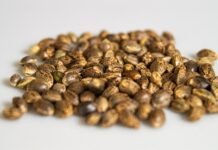As any good cook knows, spices are an essential ingredient to almost any quality dish. But did you know that adding natural spice to your meals can also boost the food’s nutritional value?
It’s true! By adding herbs and healthy spices to your meals, you’ll find that your food not only tastes better but is better for you as well. From fighting disease to boosting the appearance of your skin, spices pack a serious punch in terms of health benefits.
To learn all about the health benefits of some of the most commonly used herbs and spices, just keep reading.
1. Cinnamon
Cinnamon is one of the most powerful antioxidants in the world, meaning that it fights oxidative damage within your body, the culprit behind many signs of aging.
In addition to its anti-aging effects, cinnamon is an extremely effective tool for lowering blood sugar levels. Cinnamon slows the breakdown of carbohydrates within your system, protecting your body’s insulin sensitivity. In doing so, it helps to fight against diabetes and can improve symptoms in those already diagnosed with the condition.
Best of all, you can reap all of the health benefits of cinnamon with about 1 teaspoon of this delicious spice per day. Sprinkle it on your morning toast or in your tea or coffee to improve flavor and give yourself an extra shot of nourishment.
2. Turmeric
Have you ever wondered what makes curry yellow in color? It’s turmeric! Turmeric has been used in traditional medicine for centuries and contains several compounds with medicinal properties.
One of the most powerful of these compounds is known as curcumin. Like cinnamon, curcumin is an incredible antioxidant and helps boost your body’s antioxidant enzymes while fighting oxidative damage.
Curcumin is also a strong anti-inflammatory. Even low-level inflammation can wreak havoc on the body over a prolonged period of time. In fact, inflammation is the root of just about every chronic disease you can think of.
3. Peppermint
One of the best natural ingredients you can add to your coffee or tea is peppermint. With its storied history in folk medicine and aromatherapy, peppermint comes with a wealth of health benefits.
For starters, peppermint used in its oil form is a potent pain management tool. It also helps to relax the muscles in your colon and intestines, relieving symptoms of irritable bowel syndrome (IBS) and other intestinal complaints.
Feeling a little bloated? A dash of peppermint can help. Experiencing a bout of nausea? Put some peppermint oil in your diffuser and feel your symptoms dissipate.
4. Sage
Sage has such a reputation for its powerful healing properties that, in Latin, sage literally means “to save.” Sage can help with a number of diseases and disorders and even improves brain function and memory, meaning it’s useful in the fight against Alzheimer’s disease.
This is because sage inhibits acetylcholine breakdown in your brain, a chemical messenger essential to mental sharpness and health. But even if you don’t have Alzheimer’s disease, sage can take your brain and memory function up a notch and prevent future disease.
5. Natural Vanilla
Taken from the pod of the vanilla plant, vanilla extract is one of the most common ingredients in cooking and baking. Everyone knows that vanilla smells delicious and heightens the flavor of your dishes, but it also comes with many health benefits.
Now, vanilla is among the most expensive spices in the world, meaning there are many synthetic vanilla options on the market. While these are fine alternatives in terms of taste, you need natural vanilla, such as that from Real Tahitian vanilla beans, to experience the health benefits of the spice.
The smell of vanilla has a natural calming effect, so it can provide relief from everything from anxiety to sleep apnea. Its antioxidants can also help with toothache pain! Next time you’re experiencing tooth pain, put a couple of drops of vanilla on a cotton swab and dab the affected area.
6. Cayenne Pepper
A type of chili pepper, cayenne pepper contains an ingredient called capsaicin, which is used in many weight loss supplements thanks to its ability to reduce appetite and increase fat burning.
This means adding a gram of cayenne pepper to your favorite dish will give it a kick and help you lose weight at the same time! Capsaicin is also thought to combat several types of cancer, including prostate, lung, and liver cancer.
7. Ginger
Like many of the other spices on this list, ginger has been used in alternative medicine for generations. One of the most common uses for ginger is to combat nausea.
By consuming a gram of ginger, you’ll find that you can successfully treat nausea caused by illness, seasickness, motion sickness, morning sickness, and chemotherapy.
Ginger is also an anti-inflammatory, meaning it can be used in pain management and disease prevention. Lastly, when mixed with other spices such as cinnamon and sesame oil, ginger can help decrease pain and stiffness from osteoarthritis.
Add Natural Spice to Your Dishes to Improve Your Health
When many people think of healthy foods, they think of bland, boring options, so they stick to the unhealthy choices they’ve always made. But this couldn’t be further from the truth! With just a dash of natural spice, you can make any dish a pleasure to eat.
When your diet is built on the whole, nutrient-dense foods like proteins, fruits, and vegetables, with plenty of spices thrown in, you’ll find that you look and feel better than ever.
Looking for more tips for improving your health and fitness? Be sure to check out our blog!


























